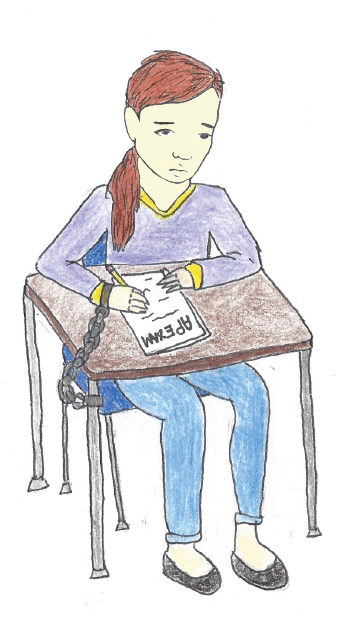Faculty stresses, enforces not opting out of AP exams
Students are being forced to take AP tests at the end of the year even if they do not want to.
With the arrival of May comes the arrival of the Advanced Placement (AP) testing season, with this year’s exams occurring from May 7-11 and 14-18. The tests serve as the culmination of the AP classes that high school students have taken throughout the academic year, potentially rewarding students with potential college credit depending on their score. Yet, many students have failed to realize that taking these tests is not a choice, it’s the only option.
“When you sign up to take [an] AP course, the expectation as [for] you signing up is to take this test. You’ve been told this from day one, and even in January. [If you say] ‘My college that I’m going to or trying to go to doesn’t accept this [credit] so therefore I don’t want to take the test,’ you can’t at the last minute change your mind and expect everything to be okay,” said Assistant Principal Eric Mitchell.
For Lauryn Willis ‘18, not taking her AP Calculus AB test would not only save her from paying the hefty testing fee but also valuable time.
“I really don’t want to take the test because on my practice exam I got a low score, so there’s no point in spending $120 on a test that I’m going to fail,” said Willis.
Since she had to pay off school fees in order to purchase her prom ticket, Willis has already paid for her test in full and is now exploring refund options.
“I’ve been studying a lot this whole school year and haven’t gotten any good outcomes, so I just see the test as a waste of money and time,” said Willis. “I don’t need it for my major in college.”
Willis works at Blaze Pizza and splits her school fees with her parents, so the money she’s paid towards the test is partially money she’s earned on her own.
Jones’ Director of Finance and Operations, Jeremy Voigt, says that refunds are not an option for students not wanting to take the AP test.
“When students sign up for the class, they are working toward that AP exam at the end of the year, [which]t is part of the curriculum,” said Voigt. “There shouldn’t be any reason to refund it, they should all be taking that test.”
Both Mitchell and Voigt also stress that in drastic cases, opting out of an AP test and receiving a refund are possible, but contrary to what most believe, it’s not just something any student can do.
“We have some situations where students have not necessarily been healthy or present and in some of those extreme cases, it’s unfair to force someone to take something they’re not prepared for,” said Mitchell.
From one teacher’s perspective, every student should be required to sit through the AP test.
“A kid signs up for the [AP Calculus] class with the expectation of taking the AP exam, that’s the whole point of taking the class. If you just wanted the college experience, you could just stick with honors [calculus], which at Jones is rigorous,” said Mathematics Department Chair and AP Calculus AB teacher Kimberly Bowman. “If you’ve made it until March, you’ve committed. You can’t decide in late March or April that you can’t handle it, you should have realized that sooner.”
AP English Literature and Composition teacher Benjamin Dipman feels similarly to Bowman.
“I believe if a student takes an AP class, then I, as a teacher within that AP class, expect all students to take the exam,” said Dipman. “In addition to expecting it, I would hope they would take the exam, that they want to take it. The exam is an intense block of time that in certain cases shows that the students have learned and benefitted from the class, and I even believe that the students can learn from the exam itself.”
Both Bowman and Dipman agree with Mitchell that under special circumstances, opting-out of the test should be allowed.
“I think the only reason a student should opt-out of the exam is if the student would struggle financially because of the cost of the exam, and if that’s the case, then I would hope the school would be able to help cover the cost,” said Dipman.
AP Environmental Science teacher Eric Hancock said he encourages all of his students to take the exam, citing that it’s always better to try something and fail rather than to no try at all.
“I think there’s value in trying and failing and knowing that you gave it your best shot, as opposed to giving in to your fears about the subject and taking the test. Now, sometimes, it can be healthy to not take the test, if you have a lot of things that are going on and it creates anxiety, then the test can be more harmful than good and become an individual situation,” said Hancock.
While taking an AP test seems stressful and all-important, Hancock stressed that it’s important to put the test in perspective.
“Your success or failure on the AP exam is not synonymous with your success or failure in the course at large,” he said. “I hope my students took the class because they wanted to learn about environmental science, and I hope they learned a lot about that, and I hope that it’s been a worthwhile experience regardless of how they do on the exam.”

INTERESTS & EXTRACURRICULARS: Volleyball, Best Buddies, SKIJCP
ONE WORD TO DESCRIBE ME: Affable
IN TWENTY YEARS: U.S. Ambassador/Diplomat
FAVORITE...

INTERESTS AND EXTRACURRICULARS: science Olympiad, math team, photography, music
ONE WORD TO DESCRIBE ME: Red
IN TWENTY YEARS: I hope to be...









